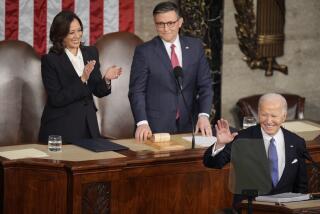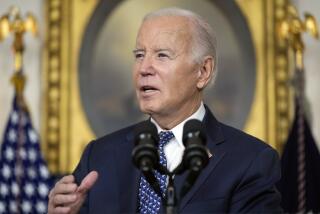Bush and history
Asked six years ago about how history would judge the Iraq war, George W. Bush offered this characteristically cavalier response: “History. We don’t know. We’ll all be dead.” Like the war that came to define it, Bush’s presidency conceivably could be viewed more favorably by historians than it is by the nation that looks forward expectantly to his retirement on Tuesday. But our verdict today is that, despite some important accomplishments, the Bush years were a time of squandered opportunities, shocking abuse of power and cynical abandonment of both legal principles and historical values.
In 2001, after the Supreme Court secured his victory in the electoral college, Bush promised in his first inaugural address “to build a single nation of justice and opportunity.” Echoing the centrist themes of his campaign, the new president added: “America, at its best, matches a commitment to principle with a concern for civility.”
Alas, the promise of that first inaugural has been honored mostly in the breach. From a refusal to consult with Congress on post-9/11 anti-terrorism policy, to an arrogant disregard for world opinion and modern science, to the misplaced loyalty that allowed Donald H. Rumsfeld and Alberto R. Gonzales to linger in his Cabinet, Bush’s presidency too often was characterized not by consensus-seeking but by a cocksureness that ruled out the admission of error.
We know what the president’s defenders will say: Everything changed on Sept. 11, 2001. Bush himself, in his farewell address Thursday, said: “As the years passed, most Americans were able to return to life much as it had been before 9/11. But I never did. Every morning, I received a briefing on the threats to our nation. I vowed to do everything in my power to keep us safe.” No one would dispute that the president must be vigilant about preventing another devastating terrorist attack. But Bush treated 9/11 not only as a mandate for protecting what came to be known as the “homeland” but as an all-purpose pretext for flawed policies.
The signal example of such a rationalization was the war against Saddam Hussein in Iraq. Advertised as a preemptive strike on a nation with weapons of mass destruction, the war also was justified as an extension of the post-9/11 war on terrorism. The dubious claim that Iraq was the central front in that war became a self-fulfilling prophecy when the bungled U.S. occupation of that country provided Osama bin Laden and his allies with a propaganda bonanza -- while distracting attention from a worsening situation in Afghanistan. Eventually, Bush conceded that “Saddam Hussein was not responsible for the 9/11 attacks.”
Beyond particular policies, Bush’s prosecution of both the war in Iraq and the war on terror was driven by a stubborn, go-it-alone mind-set. The administration bypassed Congress (and the military justice system) by unilaterally establishing military commissions to try suspected terrorists at the Guantanamo Bay detention facility, a policy for which the administration was rebuked by the Supreme Court. It sought to redefine torture to permit outrageous interrogation methods such as waterboarding. Finally, there was the electronic surveillance -- without court orders -- of communications between Americans and suspected terrorists abroad. In acting alone, consistent with Vice President Dick Cheney’s extravagant notions of executive power, the administration alienated not only Congress but conscientious lawyers within the administration. The same contempt for professionalism led to the appalling politicization of the Justice Department under Atty. Gen. Gonzales.
The irony is that when the administration did go to Congress, it received much of the authority it sought. After the Supreme Court found fault with Bush’s military commission system, Congress legislated an alternative. Likewise, the secret surveillance program operated by the National Security Agency was legalized, with new privacy safeguards, in revisions of the Foreign Intelligence Surveillance Act. In waiting to engage the legislative branch until after it was forced to do so, the administration alienated members of Congress whose cooperation was necessary for the success of Bush’s domestic agenda. (It didn’t help that when he was in election mode, Bush suggested that Democrats were defeatists who wanted to “cut and run” in Iraq.)
Even the president’s harshest critics must concede that he had some successes. The enactment of a prescription drug benefit under Medicare was a logical extension of the premise of that program: that elderly Americans shouldn’t be impoverished by medical expenses. Bush cooperated with Democrats in that initiative, as he did in the push for national education standards in the No Child Left Behind Act and in the failed attempt to enact comprehensive immigration reform. He pressed for funding to contain the spread of AIDS in Africa. His two appointments to the Supreme Court, Chief Justice John G. Roberts Jr. and Justice Samuel A. Alito Jr., were undeniably qualified. Both justices are conservative, but neither -- so far -- has embraced the radicalism of justices Antonin Scalia and Clarence Thomas, who would overturn Roe vs. Wade. Finally, it’s a fact that this country hasn’t endured another 9/11 -- though Bush must share credit with members of Congress who supported the creation of a Department of Homeland Security when he opposed the idea.
These accomplishments are overshadowed, however, by manifold miscalculations that can’t be excused by an appeal to post-9/11 realities. Although no one can be sure, we suspect that future historians will reach the same judgment.
More to Read
A cure for the common opinion
Get thought-provoking perspectives with our weekly newsletter.
You may occasionally receive promotional content from the Los Angeles Times.






